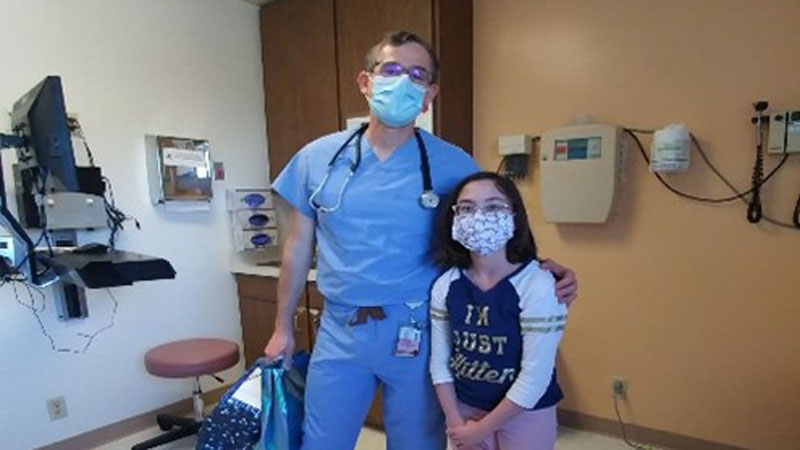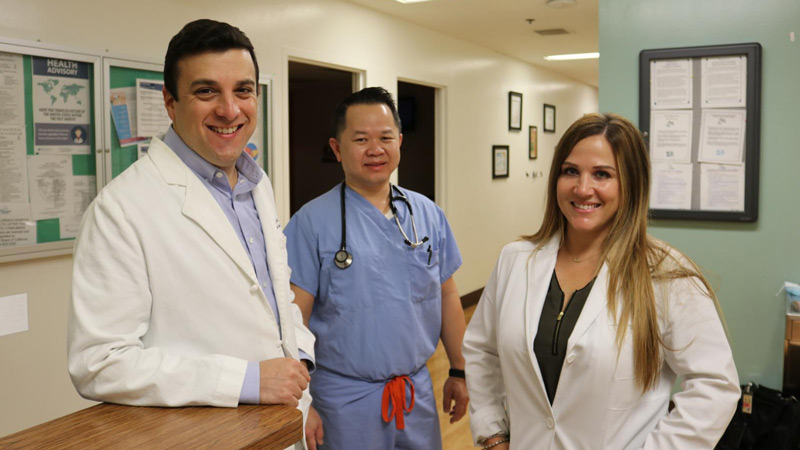Chloe Fujii was preparing for her first year at Torrance High School when she began to notice some unusual digestive habits. She felt a continuous discomfort in her abdomen, and immediately after eating she often felt a strong urge to use the restroom. Unknowingly, Chloe started her first year of high school with ulcerative colitis.
Ulcerative colitis is an inflammatory bowel disease (IBD) that develops gradually over time. This condition causes long-lasting inflammation, irritation and sores in the colon, due to the overproduction of inflammatory markers. Ulcerative colitis is an auto-immune disease, which is a type of disease where the cells are attacking one’s own body.
During the first few weeks of school, Chloe was a “normal” high schooler, hanging out with friends and eating like normal teenagers do. She noticed the symptoms that happened at home also happened at school. “It got so bad that eventually I stopped eating before and during school,” Chloe recalls. “I was embarrassed to constantly ask permission to use the restroom.”
Two months into the school year her symptoms worsened. She felt constant pain in her abdomen, had a fever that never seemed to go away and she had lost 15 pounds. Her parents took her to a local hospital.
After two days, the local hospital determined she needed a higher level of care. Chloe was transported to MemorialCare Miller Children’s & Women’s Hospital Long Beach, where she remained for 15 days under the care of Anjuli Kumar, M.D. Dr. Kumar is part of the Inflammatory Bowel Disease Program at Miller Children’s & Women’s, which is dedicated to treating kids with ulcerative colitis and Crohn’s disease.
After undergoing an endoscopy and colonoscopy, Dr. Kumar formally diagnosed Chloe with ulcerative colitis.
“The first thing we did to help Chloe was start her on two maintenance medications, Remicade® and methotrexate, as well as steroids to get her inflammation under control quickly,” says Dr. Kumar.
Remicade® and methotrexate are medications that target inflammatory cells and calm the immune system down, to allow the body to heal and to reduce symptoms of ulcerative colitis.
During this time, Chloe began to feel a great amount of anxiety. Dealing with the stress of starting high school and now living with a new disease eventually took a toll on her.
“Anxiety can also weaken your immune system and cause symptoms similar to ulcerative colitis, making it harder to distinguish worsening of the disease from nerves,” says Dr. Kumar.
To ease her anxiety, Chloe began therapy and decided she wanted to learn as much as she could about her disease to take back control. Through her journey, Chloe felt inspired. As a long-time Girl Scout, she finally found the focus for her Girl Scout Gold Award – she would create a graphic novel about the memories and events surrounding her diagnosis to help other teens diagnosed with a chronic illness. The Girl Scout Gold Award is the most prestigious award that Girl Scout Seniors and Ambassadors can earn and pushes young women to make their mark on their community that creates a lasting effect on the lives of others.
“I had to figure out painful lessons about health and mortality by myself,” says Chloe. “I had no one to relate to that was in the same position as me, and because I was sick, I felt that I was worth less than ‘normal healthy’ people. I hope sharing my story will help other teenagers diagnosed with a chronic illness feel less alone. I want other teens to learn valuable lessons from my story – whether it’s be kind to yourself, believe in your strength, or simply know your worth.”
As she works hard on her graphic novel, she also has regular follow up appointments with Dr. Kumar and her symptoms continue to improve.
“Dr. Kumar and the nurses helped me get through a confusing time in my life,” says Chloe. “They put my mind at ease and were understanding of my anxiety. They made the process much easier for me and inspired me to do the same with my novel. I’m proud to be able to help other teenagers going through similar experiences.”




